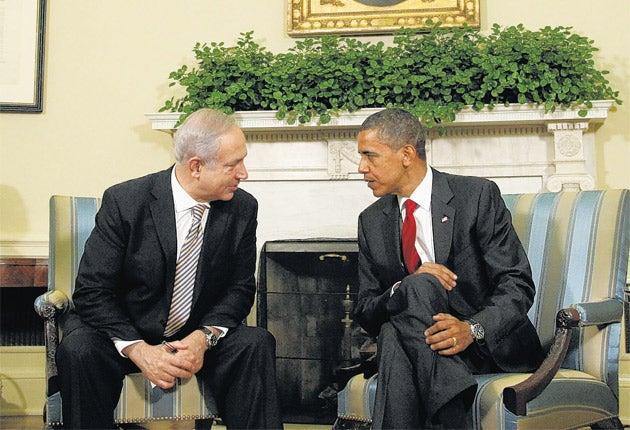Patrick Cockburn: American politicians face domestic constraints to talking tough with Israel
US strength in the Middle East has been reduced by the failures in Iraq and Afghanistan

Meetings between US presidents and Israeli prime ministers are usually preceded by speculation that the US leader will finally demand that Israel stop expanding settlements in the West Bank, displacing Palestinians in East Jerusalem and embarrassing the US by misjudged military actions.
Before yesterday's White House encounter there were particularly loud criticisms of Israel from the US security establishment. The influential commentator Dr Anthony Cordesman of the Centre for Strategic and International Studies said that America's commitment to Israel's security "does not justify or excuse actions by an Israeli government that unnecessarily makes Israel a strategic liability when it should remain an asset".
Dr Cordesman said that Israel should be more careful about the extent to which it tests the limits of US patience and exploits the support of American Jews. He warned Israel against launching an attack on Iran in the face of a US "red light".
The US is particularly sensitive to the negative fallout of Israeli actions in the Middle East because America's strength in the region has been reduced by the failure of its military intervention in Afghanistan and Iraq to achieve their objectives. On top of this Israel itself is getting politically and militarily weaker. The high point of Israel's influence in the Middle East was after the peace agreement with Egypt in 1979 which freed it to invade Lebanon in 1982. But intervention in Lebanon turned into a prolonged guerrilla war ending with Israel's final withdrawal in 2000. Military operations in Lebanon and Gaza in the following 10 years have uniformly failed to achieve their objectives. Meanwhile the head of Mossad, Meir Dagan, said that America's need for Israel is less since the end of the Cold War.
It may be in the interests of the US to restrain Israel but this is almost certainty not going to happen. The reason why is shown by the strange story of the attempt by General David Petraeus, now commander in Afghanistan, previously head of Central Command and America's most prestigious general, to put on the record the fact that US support for Israeli actions in the Middle East was endangering the safety of US troops. He reiterated this in written testimony before Congress in March.
But no sooner had General Petraeus done so than he was swiftly rowing back. The explanation for General Petraeus's swift turnaround suggests that he wants to keep open the option of running for the presidency as Republican candidate in 2012 and does not intend to alienate Jewish voters or militant neocons.
The episode illustrates the domestic constraints on any American political or military leader constraining or even criticising Israel. It is possible that President Obama privately took a tough line with Mr Netanyahu yesterday, but he is unlikely to take effective measures to pressure Israel for fear of increasing expected Democratic Party losses in the mid-term elections. No crisis in US-Israeli relations is likely, though this is the one thing that might make Israeli voters reject Mr Netanyahu.
Join our commenting forum
Join thought-provoking conversations, follow other Independent readers and see their replies
Comments
Bookmark popover
Removed from bookmarks